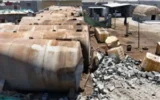The legal mask on the face of fuel smuggling; what is behind the dangerous game of mini-refineries?

According to Energy Press, while the government has turned to imports to supply domestic fuel, some media reports show that a significant portion of this subsidized fuel ends up in border countries through licensed routes; this process is not carried out by hidden mafias, but under the guise of mini-refineries or small refineries. These units, which were formed under the slogan of “national production”, have become a means for the legal but non-transparent export of fuel.
Double game with production licenses
There are about 200 active mini-refinery units in the country, some of which produce “halal” products on the surface, but in practice, they smuggle diesel fuel that is heavily subsidized by the government across the borders. By receiving cheap feedstock from the government, these mini-refineries have actually paved the way for billions of tomans in subsidies to leave the country instead of producing useful products.
In this cycle, the first ring begins with the official purchase of feed from the stock exchange by mini-refineries. To make the matter seem legal, some mini-refineries are even willing to sell the feed below the price in order to obtain only an “origin invoice” to present to customs. These invoices are the main basis for abusing the official system; because with their support, smuggled cargo can be passed under the guise of legal exports.
Halal on the surface, diesel on the inside
The focal point of this corruption is the same invoices that are stamped in the official cycle, but the reality behind them is something else: halal that is confirmed in the laboratory, but at the destination, bears a strange resemblance to diesel. This issue has not been officially confirmed or denied so far, but its denial can be seen in complaints from neighboring countries.
The mini-refineries then turn to the open market, where diesel fuel that costs 270 Tomans per liter is, with a few simple tricks, transformed into a product labeled “halal” and sold for up to 108,000 Tomans in Turkey, 81,000 Tomans in Pakistan, and 72,000 Tomans in Afghanistan. These numbers represent only a fraction of the huge profits that are extracted from national subsidies.
Tags:fuel
- Comments sent by you will be published after approval by site administrators.
- Comments that contain slander will not be published.
- Comments that are not in Persian or not related to the news will not be published.

Comments
Total comments : 0 Awaiting review : 0 Date: 0